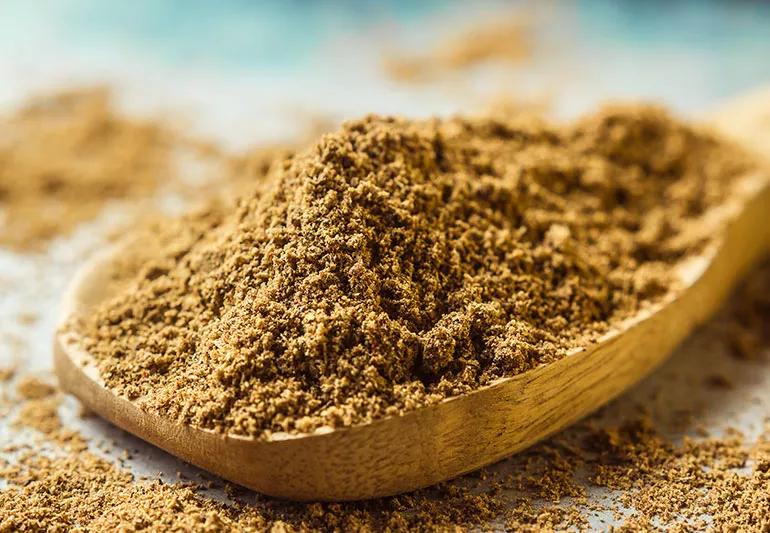Cumin’s potential benefits and how to use it

Image content: This image is available to view online.
View image online (https://assets.clevelandclinic.org/transform/7e392e57-b487-45c5-8c72-a6ae770aab52/CC_HE_Cumin_jpg)
A close-up of a wooden spoon with a big pile of the brown spice cumin
Looking to kick your flavor profiles up a notch? Cumin is a delicious addition to any recipe and offers some health perks, too.
Advertisement
Cleveland Clinic is a non-profit academic medical center. Advertising on our site helps support our mission. We do not endorse non-Cleveland Clinic products or services. Policy
Cumin comes from the Cuminum cyminum plant, a member of the parsley family. It’s most often used in ground form, but you can also buy it in whole seeds.
Registered dietitian Nicole Hopsecger, RD, gives the lowdown on what this commonly used spice has to offer.
Many website tout health benefits of cumin, including weight loss and blood sugar control. But Hopsecger urges caution when it comes to these claims.
“There’s not enough research to support them,” she says. “In the few studies that do, there are likely other factors going on in addition to the cumin supplement, such as increased motivation or lifestyle changes.”
For example, one study showed an improvement in cholesterol levels after participants took 3 grams of cumin powder per day for three months. “But the sample size of that study was small, so more research is needed,” Hopsecger says.
One thing you can bank on is cumin’s antioxidant properties, which help protect your cells. “A diet high in antioxidants can help reduce the risk of heart disease and some other chronic diseases,” adds Hopsecger. “Of course, that goes hand-in-hand with making sure your diet is also high in other antioxidant sources, including fresh fruits, veggies, whole grains and legumes.”
Advertisement
To reap benefits from cumin in your kitchen, Hopsecger recommends using ground cumin instead of cumin seeds.
“Grinding up the seed increases our ability to absorb it,” she says. “You also get more benefits from the vitamins and minerals it contains, such as B vitamins, vitamin E, iron and magnesium.”
Store any unused cumin in a dark, cool location.
Any amount of cumin spice in recipes is generally considered safe. But if you opt for a cumin supplement, Hopsecger recommends following the instructions on the label. “Choose a cumin supplement that is USP (United States Pharmacopeia) verified,” she adds. “And since cumin supplements may interact with certain medications, talk to your doctor first.”
Cumin has a warm, earthy flavor. It’s a recipe staple in cuisine from:
“It’s great to include that cooking style in your repertoire,” says Hopsecger. “Try mixing cumin into a homemade, sodium-free taco seasoning to use on Mexican dishes. You could even put it in guacamole, curry dishes or bean chili.”
Advertisement

Sign up for our Health Essentials emails for expert guidance on nutrition, fitness, sleep, skin care and more.
Learn more about our editorial process.
Advertisement
Pick bell peppers to help fight cancer, memory decline and joint pain
The tropical fruit is a good source of antioxidants and vitamin C
High amounts of cholesterol and saturated fat in red meat may be linked to heart disease
The leaves and pods from this tree are rich in essential nutrients
This starchy root vegetable is a staple in many global cuisines — but it has to be prepared correctly, or it can cause serious concerns
These delicate green sprouts can give you an extra dose of vitamin K and other nutrients — but they’re not safe for everyone
Edamame, lentils and chicken breast are good sources of protein
Eating this root vegetable can help support your eye, heart and brain health
Prioritize your health by managing stress, strengthening your social connections and getting quality sleep
Bolsters, blankets, pillows and blocks can offer extra support, stability and comfort
Allergies, postnasal drip, asthma or reflux could be to blame for a cough that won’t quit